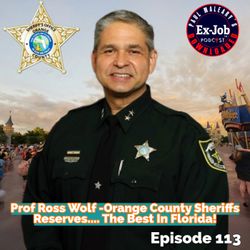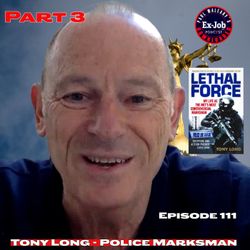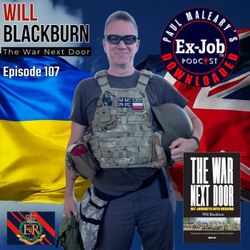Share

Paul Maleary's Ex-Job Downloaded Podcast
Former BTP Officer Mark Bishop- I was in the Met for 3 days
Born in Islington where he was brought up. He went to school with members of band Spandau Ballet and was very friendly with Tony Hadley.
Aged 15 he decided to join the cadets but after a lot of medicals the Met Police decided that his eyesight was not up to standard and was unable to join. At 18 the Metropolitan Police wrote to Mark and offered him a job.
He accepted the role, and he joined on a Monday and by the Wednesday he left Hendon! He went on to become a telecom engineer he then opened a dance wear shop which subsequently closed.
During a shopping trip to Letchworth he saw the recruitment team for Hertfordshire and decided to apply and was accepted. He was sent to Bruche for training which he found particularly difficult.
His initial posting was Hatfield, and this is described as not being very nice and is the subject of the books written by Charlie Owen. Mark took on the beat at Codicote where he got to meet Kim Wilde. Upon the closure of the rural beats Mark was posted to Hitchin.
Having been posted to Boreham wood Mark decided to apply for the Metropolitan Police and was accepted. He was posted to Islington and his dreams were shattered. It wasn’t the force that he had hoped it would be.
He returned to Hertfordshire for until 2005 when he applied for and was accepted to British Transport Police and was posted to Kings Cross. During his time he experienced the delights of traveling football fans and people who had jumped in front of a speeding train.
Following the Borough Market/London Bridge attack Mark became the spoc for PC Wayne Marques and was disappointed at the reaction of the senior BTP management.
More episodes
View all episodes

115. Janet Percival - Who is Alex Belfield? Part 2
41:39||Ep. 115Alex Belfield is a former radio presenter for BBC Radio Leeds who was dismissed for misconduct. He was convicted of stalking charges in September 2022 and imprisoned.Belfield worked at Mansfield 103.2 FM in the early 2000s. He presented the mid-morning show on BBC Radio Leeds. In 2010 he made lewd comments about weather presenter Keeley Donovan's broadcasts at home that resulted in complaints from listeners. As punishment, Belfield was suspended from the station for a day and strongly reprimanded by BBC bosses.On 18 June 2021 Belfield was summonsed to appear at Nottingham Magistrates' Court, where he was charged with 12 counts of stalking "involving fear of violence or serious alarm or distress" on 1 July.On 29 July 2021, Belfield appeared at Nottingham Crown Court accused of stalking eight people between November 2012 and March 2021, including BBC staff members Stephanie Hirst and Jeremy Vine.Belfield was convicted in September 2022 for four of eight stalking charges at Nottingham Crown Court. He was sentenced to five and a half years in prison; before sentencing "he was allowed to deliver a closing speech deriding the case as a 'BBC and police witch-hunt' based on five arrests and 3 invasions of his home, without a warrant and any evidence of any crime, and describing himself as 'the No 1 anti-BBC journalist'". He told the jury "I am offensive... My human right allows me to speak words that are not to everyone's taste". The judge said that while Belfield acknowledged the distress he caused the victims, he showed more concern during the proceedings about being treated unfairly and how the process impacted him (Belfield) personally. A bid for leave to appeal was refused in February 2023.In May 2024, the Nottinghamshire police detective who had led the stalking investigation into Belfield won a libel case against him. Belfield had falsely accused the detective of being corrupt, lying in court and colluding with the BBC in a witch hunt against him.Belfield was released from prison in June 2025, after 2 years and 9 months. He will serve the remainder of his sentence on licence.Janet has her own channel on Ticktok#AlexBelfield#StalkingInvestigator#CriminalConviction#TrueCrime#JusticeServed#CrimeDocumentary#CyberStalkingAwareness#LegalSystemInsights#PrisonSentence#VictimAdvocacy#InvestigativeJournalism#CrimeNewsUpdate#SocialMediaSafety#CourtCaseAnalysis#PublicInterestStory
114. Janet Percival - is 38 too old to join the police Part 1
42:08||Ep. 114"Janet always wanted to be a police officer. Growing up, she would sit beside her uncle, who had been chief constable, listening intently to his tales of the job—stories filled with bravery, camaraderie, and the occasional humour that only those in law enforcement could appreciate. The desire to don the uniform and protect her community coursed through her veins. However, when she turned 18 and applied for the Surrey Police, she faced disappointment as she failed the selection process. Undeterred, she joined the special constabulary in Nottinghamshire, where she learned the ropes of policing, even though the ongoing failures in her applications for the regular service felt like a persistent shadow looming over her aspirations.It was during a heartfelt conversation with her brother that the spark of hope reignited. He informed her that Sussex Police were seeking recruits. The excitement bubbled up inside her as she envisioned herself wearing the badge she so dearly coveted. In 2003, after rigorous training and determination, she finally passed the fitness test. Her first posting at Brighton was a blend of nostalgia and novelty, where she was immersed in old-school processes—making tea for her colleagues as a rite of passage before stepping into a police car. Each sip of that tea felt like a connection to those stories from her uncle, a small reminder of where she came from and the journey ahead.Yet, as she transferred to Nottinghamshire, the reality hit hard. The stark contrast between her experiences in Brighton and Nottinghamshire was shocking. The lack of staff and resources forced her into situations where she had to rely solely on her instincts and skills. Unlike Brighton, where support was always a radio call away, here she had to navigate the challenges independently. It was a steep learning curve, but Janet was resolute. With grit, she took her detective exams, transforming her into a competent investigator. Each case was not just a job but a puzzle she was determined to solve—a testament to her dedication.Despite the challenges, Janet’s transition to Nottinghamshire often felt like a backward step. The outdated practices she encountered were immensely frustrating. While Sussex embraced modern techniques, Nottinghamshire seemed entrenched in the past, making her feel out of place. She often reflected on how different things could be, fuelling her drive to advocate for change in policing methods.As she tackled high-profile cases that captured public attention, including one notorious suspect who received a staggering 32-year prison sentence , Janet found her true calling. It was a particular case involving stalkers that struck a chord with her. Drawing on her empathy and understanding, she successfully obtained the first non-domestic stalking protection notice in the UK. It was a landmark achievement that made headlines, but she was not just a figurehead; she was deeply involved, reviewing investigations meticulously. Her recommendations led to actionable outcomes that resulted in prosecutions, giving a voice to victims who often felt powerless. Each successful case reinforced Janet’s commitment to ensuring justice, leaving an indelible mark on her career and the community she served.
113. Ross Wolf- Are Orange County Sheriffs Reserve The Best In Florida?
44:58||Ep. 113Are Orange County Sheriffs the best in Florida? Explore everything you wanted to know about policing in the Sunshine State!Meet Ross, a passionate professor of criminal justice at the University of Central Florida in Orlando. Not only is he dedicated to educating the future leaders of law enforcement, but he also serves as the dean of the College of Innovation and Education, encompassing disciplines like Criminal Justice, Legal Studies, and Police Administration. Ross’s journey into the world of law enforcement began unexpectedly, sparked by a simple yet transformative suggestion from a friend who was a deputy sheriff in Orange County."You have to experience it for yourself," she urged, and thus began Ross's adventure. He joined her on a ride-along, filled with excitement and a hint of trepidation. As the patrol car cruised through the vibrant neighborhoods of Orange County, Ross felt a rush of adrenaline each time they responded to a call. He became hooked on the thrill of policing, leading him to undertake an auxiliary deputy training course. However, the dynamics of the precinct—filled with camaraderie, challenges, and community service—only fueled his desire to dive deeper into the badge-wearing world.Initially feeling unfulfilled in his full-time role, Ross made a pivotal decision to join the Orange County Sheriff's Office as a regular deputy. His journey transformed him from a patrolman into a road policing officer, and eventually, a detective on a specialized stolen vehicle squad. Each day brought a new set of challenges and the opportunity to make a tangible difference in the community. While balancing work with his academic aspirations, Ross pursued a doctorate, demonstrating an unyielding commitment to both education and public service. Once he completed this significant milestone, he recognized that a better work-life balance awaited him as a reservist.When Ross first donned the uniform of the Orange County Sheriff, he was met with the vastness of his jurisdiction—900 square miles filled with urban settings, suburban neighborhoods, and sprawling natural landscapes. This expansive area is patrolled by over 1,600 law enforcement officers, not counting those from individual cities and federal agencies. Ross recalls the sense of responsibility that enveloped him as he realized the sheer scale of policing in Florida. He vividly remembers one late night when he attended a call that involved a large community gathering. The energy was palpable, and he felt honored to be part of a team ensuring the safety of so many.The complexities of policing in Florida often weigh heavily on the shoulders of officers, especially reservists like Ross, who can perform any role that regular officers tackle, provided they possess the appropriate training. Yet, he acknowledges that the commitment to specialist units can be rigorous and demanding. "If you serve as a reservist for 20 years, you can choose your role," Ross explains, emphasizing the dedication and perseverance required in law enforcement.Training also plays a crucial role in police work, particularly when it comes to firearms. Ross remarks on the stark contrast between the exposure to firearms in Florida compared to the UK, where he often shares his experiences with students. He recalls the tragic shooting at the Pulse Nightclub on June 12, 2016, where 49 lives were lost, and 53 were injured. It was a stark reminder of the dangers officers face daily. Reserve officers were on the scene, and the gravity of that night shaped their resolve to protect and serve the community.Beyond the routine patrols and high-stakes situations, Ross highlights the unique opportunities that reservists have to earn while engaging in community events, such as providing support at Disney World.
112. Richard Keil - I was with Nina when she was murdered
01:26:25||Ep. 112This podcast contains graphic content relating to the death of Nina Mackay, a tragic event that has left a profound impact on the community.Richard Keil, a determined individual from South Woodham Ferrers, initially faced disappointment when his application to join a public service course at Chelmsford College was rejected. Yet, destiny had other plans for him. Encouraged by his sister, who was dating a Met Police Cadet, Richard decided to take a leap of faith and apply to join the cadets himself. This time, fortune smiled upon him, and he was accepted. His journey began in the heart of the community; Richard found himself immersed in the lives of others as he worked at a local boy’s club and at Plaistow Hospital, where he acted as a bingo caller for elderly residents. The laughter and joy he brought to those faces revealed the power of connection and compassion in everyday life.Upon joining the regular service, Richard was stationed at Leeman Street, navigating through some of the most iconic parts of the East End of London. He patrolled areas that had once been terrorized by Jack the Ripper, feeling the weight of history on his shoulders. Each day brought new challenges, as he learned the intricacies of policing amid the bustling streets that had seen both love and loss. The pulse of the city resonated in his every step, and he was continually deployed alongside his colleagues, each of whom became a vital part of his evolving narrative.After a few years, Richard made the transition to the Territorial Support Group (TSG), where he encountered a colourful cast of characters who imparted invaluable lessons about the art of policing. These experiences shaped his identity as an officer, nurturing a deep respect for the complexities of human behaviour in the face of adversity. The camaraderie he shared with his colleagues fostered an environment of mutual support, allowing them to face the challenges of policing together.His policing life changed on 24th October 1997. Richard was part of the team who was deployed to arrest a suspect in East London during this arrest Nina Mackay was fatally stabbed by the suspect. As Richard concluded his time on the TSG, he transitioned to the surveillance team, honing his skills in targeting criminals who roamed the metropolis. The thrill of the chase was palpable, but it was his eventual move to the armed surveillance team that marked a significant turning point in his career. Here, he faced the stark realities of high-level crime and terrorist activity, a world where split-second decisions could mean the difference between life and death. He vividly recalls his first day as a plain-clothes armed officer; it was a surreal experience, filled with tension and excitement, forever etched in his memory.In 2008, Richard's dedication and hard work paid off when he was promoted to Sergeant and assigned to Paddington. Two years later, he ascended to the rank of Inspector and took up his post in Ealing. With each promotion, his commitment to maintaining police standards deepened, especially regarding the controversial yet necessary practice of stop-and-search. Richard believed that empowering officers to value their position was crucial not just for effective policing, but for building trust within the community. His journey illustrates the resilience and dedication of those who serve, a testament to the spirit of the Metropolitan Police and the complexities of modern policing.#policingjourney #communityfirst #serveandprotect #londonpolice #NinaMackay #dedicationtojustice #policingwithheart #eastlondonstories
111. Tony Long - Controversial Police Marksman - Part 3
58:18||Ep. 111
110. Tony Long - Controversial Police Marksman - Part 2
01:02:32||Ep. 110Part 2Tony undertakes training including a course at Aldermaston to find “Dirty Bombs” during a search exercise at Lippitts Hill he encountered the SAS. We discuss the “Foxtrot 11” and the formation of D11, the specialist firearms team.During his time Tony witnesses a number of incidents that have been recorded in the annals of history for the metropolitan police. Including the shooting of an officer by a cross dressing burglary suspect called David Martin . The arrest of this man resulted in 2 officers being charged with attempted murder. The officers were subsequently found not guilty.Tony became an instructor and was part of Blue team and would assist in the instruction of officers who were authorised shots for the force. As part of “Blue team” Tony was deployed to St James Square following the murder of Yvonne Fletcher. He talks of the time spent with the SAS and how he sketched cartoons for the staff involved in the containment.His first shooting was in 1985 at a domestic siege where the suspect survived and faced trial at the old bailey. 18 months later he was called the Equalizer by the Sun. Tony had been deployed to a potential armed robbery. The robbery took place and Tony deployed from an observation vehicle. He and his colleagues confronted the suspects at an abattoir. The suspects turned, presented their weapons and believing that he was in immediate danger Tony opened fire and shot 3 suspects. 2 of them died at the scene. The 3rd man survived.The senior management were more concerned about the ethnicity of the suspects than the welfare of the officers involved.
109. Tony Long - Controversial Police Marksman - Part 1
01:02:31||Ep. 109Tony Long – Tony was educated at a private school, where his early days were filled with rigorous routines and the exploration of his passions, particularly for guns and the great outdoors. The smell of freshly polished shoes and the satisfaction of a well-made bed became the backdrop for his childhood, instilling a sense of discipline that would serve him well in his future career. By the age of 18½, when he joined the police force, navigating the complexities of law enforcement felt like a natural progression for him.Tony's first posting following training took him to Lewisham, an area alive with the vibrant pulse of London life. Even though he hailed from the serene surroundings of Sussex, he was well-acquainted with the city, his heart often drawn to its bustling streets thanks to family ties. His transition into adulthood was marked dramatically when he married his girlfriend, who was pregnant, and by the tender age of 19½, he found himself a proud father to a baby girl. This new chapter in his life brought a mix of joy and responsibility, shaping his worldview and fueling his determination to protect and serve.As Tony progressed from street duties to the SPG (Special Patrol Group), he encountered a period shadowed by the tragic events surrounding Blair Peach. The haunting memories of that time lingered, shaping the reputation of the SPG and the public’s perception of police. When he first stepped into the chaos of the 1981 Riots, he quickly realized that the streets were not just a backdrop for his duties; they were a living, breathing tapestry of human emotion and conflict. It was during this tumultuous time that he acquired his first “Nato British Army Riot Helmet,” a heavy piece of equipment that now sat as a stark reminder of the turmoil that often accompanied his role.Reflecting on the modern police service, Tony holds a nuanced view. He expresses admiration for the officers on the front lines, who now face scrutiny from “Auditors” and “Activists” in a society where every action is documented and dissected. He recalls the halcyon days of policing, a time when officers donned tunics, and the public interaction felt more personal, devoid of the ever-watchful eyes of cameras. It was a simpler time when a handshake could seal a deal and a friendly nod could disarm potential conflict.Despite an increase in population—from 27,000 officers in London in 1975 to only 30,000 today—Tony notes a concerning decline in civilian support. This paradox of fewer officers for a growing city weighs heavily on his mind, as he understands the challenges posed by this reality. The streets are now busier, and the complexity of policing has transformed dramatically, necessitating a shift in how officers approach their duties.Tony's introduction to firearms was unexpected, sparked by the urgency of an arrest before his duty shift even began. On just his second day, he was thrust into a high-stakes situation, tasked with apprehending a suspect accused of stabbing an officer. Returning to Lewisham with a team of officers, he felt the palpable tension in the air; his interactions with the public along New Cross Road starkly contrasted his earlier days patrolling the beat, each encounter underscoring the turbulence of the times.His basic firearms course, spanning five days, became a crash course in both skill and strategy. Four days were devoted to honing marksmanship on the range, while the final day opened the door to tactics that would guide him through potentially perilous situations. Through it all, he remained committed to his mission, embodying the spirit of a protector in a world that increasingly demanded vigilance and resilience.
108. Steve Reynolds - The Met On Trial
01:16:26||Ep. 108Steve Reynolds joined Essex Police Cadets in 1971, a youthful aspirant with dreams of serving his community and upholding justice. The experience was transformative, igniting a passion that would fuel his career for decades. In September 1974, he stepped into the role of a regular constable, ready to take on the challenges of policing. By 1976, Steve's diligence paid off when he took and passed his Sergeants exam. Just months later, he faced the inspectors exam, his heart pounding as he tackled yet another hurdle. With remarkable determination, he emerged victorious in both examinations, becoming a qualified sergeant and inspector before he even turned 22. This achievement was not just a personal milestone; it was a testament to Steve’s unwavering commitment and exceptional capabilities.Steve's first posting in the Criminal Investigation Department (CID) was at Rayleigh, a place where he would encounter a group of superb characters—experienced detectives who were consummate professionals. He fondly remembers his initiation into the CID, the adrenaline rush of dealing with his first suspect, and the camaraderie that flourished amidst the seriousness of their work. In May 1980, he was promoted to a substantive Detective Sergeant and assigned to South Ockendon. There, he was given collar number 321, a digit that would earn him the affectionate nickname "Dusty." Under the mentorship of DCI Fred Stanard, Steve found himself in an environment where humor was as sharp as the investigations they pursued. The opportunity to further his career arose when Peter Blyth, the Divisional Commander, encouraged Steve to apply for a uniform inspector’s role at Grays. With a mix of excitement and trepidation, he submitted his application, and after a rigorous selection process, he was thrilled to find out he was successful. His tenure as an Inspector lasted a year, but it laid the groundwork for his next significant challenge: joining C11 at Scotland Yard in 1986. There, Steve became part of a diverse team from across the region, working together to develop crucial intelligence that would be funneled to enforcement teams. After two intense years, he returned to Essex, filled with pride at having the opportunity to serve as a Detective Inspector in his hometown of Southend, where he could give back to the community that had raised him.In a harrowing twist of fate, Steve was called to investigate a missing persons inquiry in the Philippines involving a woman named China Rose Simms. The case was shrouded in mystery, enveloping him in a world of uncertainty, as neither she nor her husband had ever been located. The late 90s brought about a poignant moment when Steve had the rare opportunity to meet Jill Dando, a beloved BBC anchor. He recalls their interactions vividly, a mixture of admiration and respect shared over aspirations and plans for the future—plans that were tragically cut short by her untimely murder. One of the most challenging cases he faced was the murder of Chris Castle, an event that would test his resolve as the Senior Investigating Officer (SIO). The crime was committed by members of the extreme right-wing group Combat 18, a grim reflection of the societal issues that plagued that era. Drawing from his extensive experience, Steve penned a book titled "The Met On Trial," which explores the investigation following the fatal shooting of Jean Charles De Menezes. In this work, he reflects on a career marked by both triumphs and tragedies, illuminating the complexities of policing in a modern society. Through storytelling, he aims to provide insight into the human experiences behind the badge, a narrative that resonates not just with fellow officers but with anyone who has grappled with the moral dilemmas of justice and accountability.
107. What Is The War Next Door? Will Blackburn
01:21:37||Ep. 107This episode is brought to you by LIFESAFE Technologies Stay safe "All In 1" Fire extinguisher. Click on the link and your discount will be appliedWill Blackburn resides in Poland. He is a former Royal Military Police Reserve. He started in the London Regiment and decided to cross over to the RMP TA at Brixton. In 2003 the war in Iraq meant that his unit was mobilised to Op Telic 3 and served there for 6 months. The tour that he went on was immediately after 6 members of 156 Provost Company were killed.He did his basic training took place at Pirbright which had been a guard’s depot. All elements of the TA attended this centre so Will got to meet members from other regiments. Basic training changed over time to make them battle ready. This training gave him good grounding for his work in Ukraine.We discuss recruitment within the armed forces and the demise of recruitment by outsourcing to private companies.Will went to Chilwell to prepare for deployment to Iraq and was then bussed to Germany to wait for transport to Iraq. As they waited, they were given additional training in driving and weapons handling which will found invaluable. Will and his colleagues took a direct flight in a military chartered aircraft to Basra. Being part of Rover Group meant that Will operated as an escort and driver. Will recalls incidents where there was contact with the enemy. We discuss fatalities and Op Minimise and the fall of Nasaria. As the fall took place Will was told that the was likely to be held back and the demob date was on hold. However, this changed position changed ad having been de-kitted he was placed on an aircraft and flew back to Cyprus and then to Brize Norton in the UK. He was transported back by bus to Nottingham and sent home! He arrived back to Paddington wearing his desert combats and having to prepare adjusting back to civvie street without any decompression. Will found the transition difficult and this took several months before life normalised.In later year Will met and married his wife who is Polish. They relocated from the UK to northern Poland. At the commencement of the Ukraine Russia war there was a drive to find military equipment. Utilising the website army rumour service www.arrse.co.uk by the end of 2022 Will was invited to take part in the convoy to the frontline hand delivering much needed supplies to the troops. He has been to the Donbas and other areas that have been ravaged by war.He spent time with the fighting drone unit. The skills displayed are incredible. At one point he was 3k from the zero line. Will has become an author and describes his experiences in his book The War Next Door. https://www.waterstones.com/book/the-...Just Giving page https://www.justgiving.com/crowdfundi...